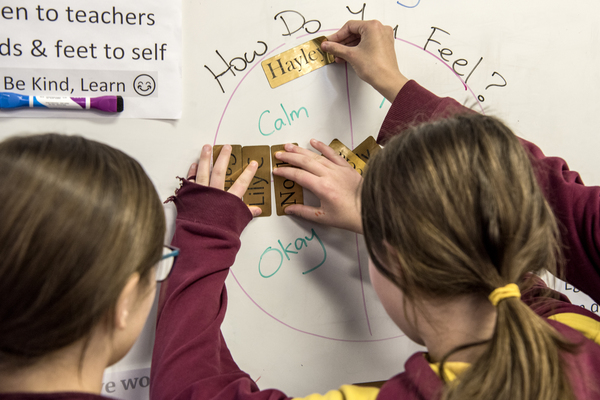Overview
Alignment with Be You Domains
-
Mentally Healthy Communities
-
Learning Resilience
-
Early Support
-
Responding Together
Alignment with Australian Curriculum
- Health and PE
- The Arts
Target audience
- Primary school
- Secondary school
Target groups
- Small group
- Whole class
- Whole school
Aims
Mind Blank for Schools showcases stories of lived experience of mental health issues and conditions. The program aims to raise awareness about mental health issues, reinforce wellbeing and help-seeking messages in the school curriculum and equip students with help-seeking skills through role play.Program theory
Research demonstrates that theatre use in an educational setting can promote positive change and support students to engage in discussions about their shared experiences. The Mind Blank program model is inspired by forum theatre practices and based on the forum theatre method originally devised by Augusto Boal. Mind Blank programs are aligned with the national mental health priorities for better awareness, prevention and early intervention in relation to suicide prevention. Programs follow a do-no-harm framework, as well as practical guidelines outlined by Mindframe. Links can be made from workshop themes to components of the Australian Curriculum.Topics
Topics include depression awareness, anxiety awareness, respectful relationships, cyberbullying and suicide prevention.Cost
Program structure
Mind Blank for School works with schools to conduct workshops and tailored programs. Programs range from a one-hour health promotion session to a 10-week term session and can be run face‐to‐face, as a hybrid session or through an online portal. Programs using the whole school approach will operate on an annual cycle. The program structure is underpinned by training teachers to familiarise themselves with the program. The program showcases age-appropriate stories of lived experienced of mental health issues or conditions. Stories are turned into a stage script by trained program facilitators and rehearsed with health professionals present to ensure that the team avoids stereotypes and encourages authenticity. Mind Blank facilitators will train a classroom of students to deliver the program each term, and the students then work in groups to showcase what they have learned to their peers (for example, Year 11 students perform to Year 10 students).Instructor
- External facilitator
Instructor training
Program facilitators are contracted actors who have program facilitation experience, as well as experience in the mental health or community sectors. All Mind Blank facilitators attend Youth Mental Health First Aid and 'Question Persuade Refer' suicide prevention training prior to hosting their first workshop. The training period for facilitators ranges from 2 weeks to 6 months on the job.Supporting resources or materials available with program
- Manual
- Online webinars
Other materials
Train the trainer.Ongoing support
Instructors receive opportunities for professional development and on-staff positions.Parent involvement
Not provided
Origin of program
Australia
Mind Blank Ltd
Program authors
Mind Blank Ltd
- Unit 6, 175 Waterworks Rd,Ashgrove QLD 4060 Australia
Ratings
Summary of evidence factors
This is a summary of the evaluation or research study characteristics that contribute to the program’s evidence rating.
|
Positive impact on at least one outcome for children and/or young people?
The study reported positive outcomes. |
No |
|---|---|
|
Link between program description and theory of change
Theory of change refers to whether there was a comprehensive description and illustration of how and why a desired change is expected to happen in a particular context. |
Comprehensive |
|
Study design
Type of study design reported. |
Pre-post cohort |
|
Independence
The degree to which the program authors were involved in the research. |
Completely |
Summary of implementation factors
This is a summary of the program’s characteristics that contribute to its implementation rating.
|
Feedback sought from participants
Participants enjoyed the program and understood its benefits. |
Yes |
|---|---|
|
Feedback sought from instructors
Instructors enjoyed the program and understood its benefits. |
Yes |
|
Groups program is not suitable for
Groups the program wouldn't be suitable for or that required further research to determine suitability. |
Not assessed |
|
Training provided during study
The model of training provided. |
Face to face train-the-trainer in person |
|
Ongoing instructor support provided during study
Whether ongoing support is provided. |
Yes |
Context
This is a summary of the context in which the evidence for the program was established.
|
Study Participants
Pre school, primary school (Foundation to Year 6), secondary school (Years 7 to 12). |
Primary school Secondary school |
|---|---|
|
Country of Study/s
The location in which the evidence or research was conducted. |
Australia |
|
Location of Study/s in Australia
The state (or states) the program was assessed in Australia. |
ACT NT NSW |
|
Evaluation of program in culturally and linguistically diverse populations
Provider has included culturally and linguistically diverse people when assessing the program. |
No |
|
Evaluation of program in Aboriginal and Torres Strait Islander children and young people
Provider has included Aboriginal and Torres Strait Islander peoples when assessing the program. |
Yes |
|
Evaluation of program in low socioeconomic groups
Program has evaluated a diverse socio-economic population in their research. |
Yes |
|
Developmental based adaptations to program design and delivery
Shorter sessions for younger students or activities are adjusted for age appropriateness. |
No |
|
Evaluation of program in children and young people with disability and/or learning difference
Provider has included participants with a disability or learning difference when assessing the program. |
Yes |
Last updated: 19 November 2021
